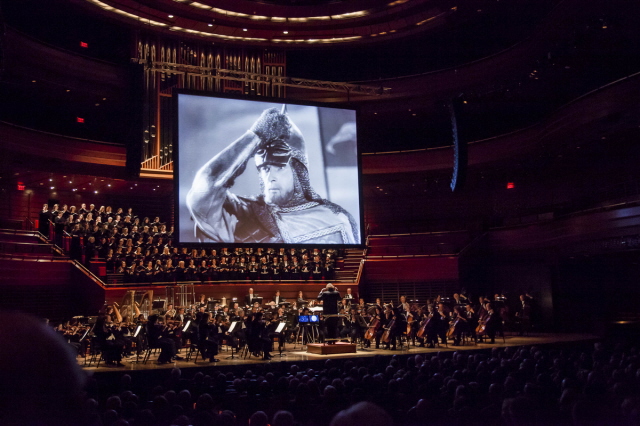
Alexander Nevsky
The Philadelphia Orchestra
Verizon Hall, Philadelphia, Nov. 17

Photo: Ryan Donnell
Bloodied and weary from 13th century war between the Russians and Germans, Vassily looses his wager for Olga, to the more valiant and near dead Gavrilo, his comrade rival. Meanwhile, the soldier is already flirting with Vassilissa and tells his mother, meet his new bride "the maiden in the chain mail." Comic relief from the unrelentingly brutal battles that came before. Cue music and that is what conductor Stephane Deneve and the Philadelphia Orchestra did in the finale of Sergei Eisenstein's Russian propaganda masterpiece Alexander Nevsky, with its famed score by Sergei Prokofiev.
The Philadelphia Orchestra followed up its hugely successful screen-orchestra presentation of West Side Story with this historic war film. Unlike a musical like West Side, Nevsky presents challenges of long stretches of no music whatsoever and the dialogue is still dicey in sections.
The movie was itself key in bringing back the lost art of live orchestra playing under a film. In the '90s, prints of Nevsky were restored, but the soundtrack was significantly degraded, even the dialogue track has distortions and the music was nothing less than mutilated. Iconic scenes of the Teutonic Knights charging over iced landscape, for instance, can now be only fully realized with the soundtrack restoration by of live orchestra.
On screen, that unmistakable aesthetic of classic Russian film by master cinematographer Edward Tisse looked great against the stage of musicians and singers. Prokofiev was composing under the unforgiving eye of the Stalin regime, which banned any artistic expression that was popular in the west, so his music of this period has added sub textual meaning.
Made in 1938 with the Stalin-Hitler pre-WWII pact, it was without a doubt a warning to the Germans to stay off of Russian soil, Russian-German pact or not. In 12th century Prussian border, Alexander Nevsky is living a peaceful life of a fisherman after defeating the Swedes, when Mongols try to land on the outer banks he tells them not to fight they will frighten the fish. The Mongol leader knows of Nevsky's war prowess and retreats.
Meanwhile, the Germans are advancing in the East and Nevsky is called on by his compatriots to vanquish them. Olga, a bored village virgin, being courted by two soldiers, tells them that fate will decide her marriage, by who is deemed bravest. Meanwhile, she's not about to pine at home, she throws on some mesh armor and a sculpted metal helmet that accommodates her braids and hit's the front lines with the men.
Amazing, for instance, that the church town bells are played with such dimension by standard orchestra chimes which was unique because Russian bells were made of various metals and stone to have a certain resonance. This was pointed out to me by a friend who is both Russian and a musician. She also told me the Russian diction by the Philadelphia Singers Chorale was excellent, credit choir director David Hayes and Russian language consultant Ghenady Meirson.
There could have been a little more orchestral thrust and cohesion in the overture and a key battle moments, but Maestro Deneve, made up for that in every line detail. The glorious crosscurrents of the violins and lower strings throughout were really spiked through the hall, as well as the burnished heralds of the combined horns. The screen over the orchestra, unfortunately cut off seeing the whole Chorale, but didn't block their sonic power at all. The finale, with mezzo-soprano Michelle DeYoung sings the battleground elegy, is intensely dramatic, DeYoung's dialect was iffy but her vocal richness and ethereal presence, perfect.
Philadelphia Orchestra's Alexander Nevsky part of the film score series at Verizon Hall, Philadelphia.
www.philorch.org
